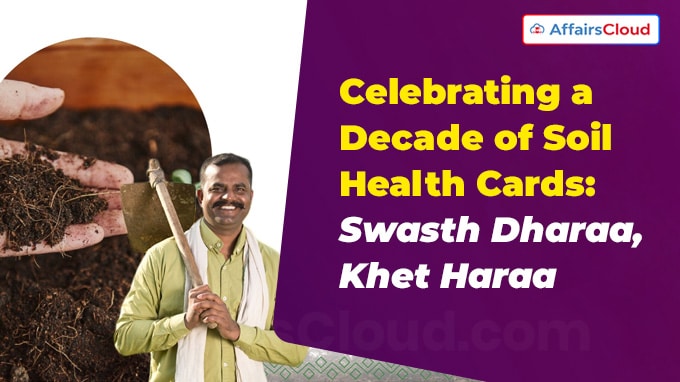 On February 19 2025, the Soil Health Card (SHC) scheme, launched by Government of India (GoI) to assist state governments to issue soil health cards to all farmers in the country, has completed 10 years of successful implementation.
On February 19 2025, the Soil Health Card (SHC) scheme, launched by Government of India (GoI) to assist state governments to issue soil health cards to all farmers in the country, has completed 10 years of successful implementation.
- The scheme was formally introduced by Prime Minister (PM) Narendra Modi on February 19, 2015 at Suratgarh, Rajasthan.
- The scheme is promoted by the Department of Agriculture & Co-operation (DA&C), Ministry of Agriculture and Farmers’ Welfare (MoA&FW) and implemented through the Department of Agriculture of all state and Union Territory (UT) governments.
About SHC:
i.GoI merged SHC scheme in Rashtriya Krishi Vikas Yojana (RKVY) scheme as one of its components under the name ‘Soil Health & Fertility’ from 2022-23.
ii.The SHC provides status of the soil based on 12 key parameters which contains
- Macronutrients: Nitrogen(N), Phosphorus (P), Potassium (K), and Sulphur (S);
- Micro-nutrients: Zinc (Zn), Iron (Fe), Copper (Cu), Manganese (Mn), Boron (B);
- pH (Acidity or Basicity), Electrical Conductivity (EC) and Organic Carbon (OC).
iii.The information provided by the key parameters of the card indicate fertilizer recommendations and soil changes required for the farm.
iv.Under this scheme, soil samples are taken two times in a year, following the harvesting of Rabi and Kharif crop respectively or when there is no standing crop in the field.
Key Benefits of SHC:
i.The scheme facilitates free or affordable access to soil tests.
ii.The scheme enable farmers to optimize their fertilizer use which further help them in minimum input costs.
Key Objectives of SHC:
i.To promote soil test based nutrient management across all states/UTs of the country. To issue SHCs to all farmers across India.
ii.To examine soil fertility related problems with standardized procedure and examine and design fertilizer recommendations.
About Village Level Soil Testing Labs (VLSTLs):
i.In July 2023, the guideline of VLSTLs was issued. These labs can be established by individual entrepreneurs i.e. rural youth and community based entrepreneurs, including Self-Help Groups (SHGs), schools, agriculture universities, among others.
ii.The guideline has specified that the minimum age of beneficiary/ village entrepreneur should be 18 years and should not be more than 27 years.
- Also, SHGs, Farmers Producers Organisation (FPO) can be enrolled as VLSTL.
iii.As of February 2025, 665 VLSTLs have been set up in 17 states of the country.
About School Soil Health Programme:
i.It is pilot project which has been implemented by Department of Agriculture and Farmers Welfare (DA&FW), MoA&FW in collaboration with Department of School Education & Literacy (DoSE&L) under the Ministry of Education (MoE), New Delhi (Delhi)-based Indian Council of Agricultural Research (ICAR) and state governments in 20 schools including 10 Kendriya Vidyalaya and 10 Navodaya Vidyalaya, in rural areas.
- The primary objective of this programme is to create awareness among students about soil health for sustainable agriculture practices.
ii.As of 2024, 1,020 schools are implementing this programme, with 1,000 soil testing labs established and 12, 972 students enrolled.
Key Accomplishments of SHC:
i.The number of soil health cards issued to farmers surged from 16.84 lakh (in 2020-21) to 53.08 lakh (in 2024-25).
ii.As of February 2025, 24.74 crore SHCs have been generated and 8,272 soil testing labs have been established across the country.
iii.So far, Rs 1706.18 crore have been released by GoI as funds to various states or UTs.
iv.As of February 2025, the Soil and Land Use Survey of India (SLUSI), a subordinate office under the MoA&FW, has generated 1,987 village-level soil fertility maps for 21 states and UTs.
- Till date, SLUSI has completed soil mapping at 1:10,000 scale for nearly 290 lakh hectares (ha), covering 40 aspirational districts.
Technological Advancements:
SHC Mobile App:
i.In 2023, GoI introduced technological advancements in the new SHC scheme. The SHC portal was revamped and integrated with a Geographic Information System (GIS).
ii.The new system operationalised in April 2023 and samples are now being collected through the mobile application (app).
iii.Web-based work flow application SHC portal has been designed and developed by New Delhi (Delhi)-based National Informatics Centre (NIC).




